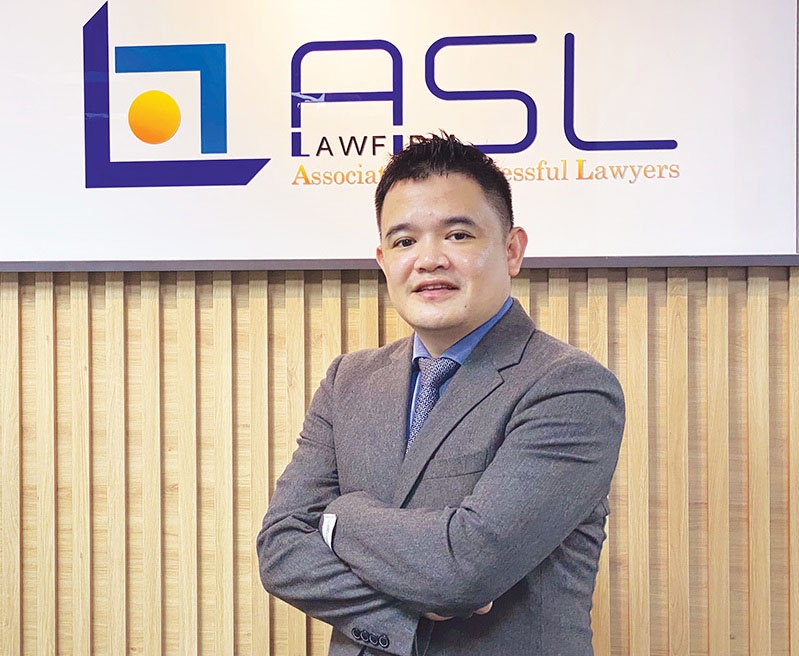Support a prerequisite for Vietnamese groups to make major mark in Singapore
 |
| By Pham Duy Khuong Managing director, ASL LAW |
As a result, the two countries have opened their door for more funding from domestic enterprises and become promising investment destinations. However, apart from advantages of this, the enterprises of one country investing in the other also face difficulties because of legal and culture differences among countries. Therefore, solutions need to be recommended to deal with these problems.
Singapore has a huge investment in Vietnam and has one of the highest foreign direct investment (FDI) inflows into Vietnam. Specifically, in 2017, Vietnam attracted strong FDI from Singapore, ranked third behind South Korea and Japan in the primary sectors of infrastructure, consumption and processing, agriculture, and food.
In the first seven months of 2020, there were 104 countries and territories investing in Vietnam, and Singapore has risen to become the largest investor in Vietnam with the total investment capital of $4.57 billion (accounted for 53.1 per cent of the total investment capital into Vietnam), compared to the second place South Korea with $984 million.
This shows that Singapore is highly focusing on investment to develop industries and fields in Vietnam. Moreover, Singaporean companies have quickly integrated into the business community in Vietnam and are strictly complying with the law, since they have a good management team and market research, as well as risk warning teams.
The companies’ projects also showed their effectiveness of investment when they have contributed to the development of science and technology because they also bring many new technologies, as well as contributed to economic development and created many jobs for Vietnamese workers.
One of the special projects is the development of Vietnam-Singapore Industrial Parks (VSIP) in Vietnam. These have paved the way for many Singaporean enterprises to invest into Vietnam and created jobs for more than 250,000 workers.
Besides that, in real estate, CapitaLand and Keppel Land are typical examples of successful investments with green urban and high-rise buildings projects.
Furthermore, since participating in new-generation free trade agreements, Singapore also considers Vietnam as a bridge for enterprises to invest in these markets. Since joining, many laws have been amended to meet the international needs in Vietnam such as laws on enterprises, investment, and land, creating a transparent environment and more investment directions for Singaporean enterprises.
It can be seen that mergers and acquisitions (M&A), processing, and real estate are the areas where Singapore focuses on investment.
For Vietnam, outward investment has been on an upward trend in recent years, but the majority of capital mostly concentrates in Laos and Cambodia in the ASEAN. Vietnam has a close relationship with Singapore and increasingly investing in this country. Significant examples are FPT Group investing in IT, and Petrolimex pouring money into oil and gas. They are typical companies that have successfully invested in Singapore but are still small- and medium-sized, which shows that Vietnam has not had much capital to invest in Singapore.
There is a huge difference between the investment of Singapore into Vietnam and vice versa. This is because Singapore has a dynamic and transparent business environment; therefore, Vietnamese enterprises have to compete fairly with others.
However, because Vietnamese enterprises do not have an abundant finance and high-tech system – while Singapore businesses boast abundant capital, high-tech development, and a logistics system – Vietnamese enterprises do not have many opportunities to compete with the enterprises of Singapore or even with enterprises from other countries.
In addition, Vietnamese groups prefer using Singapore as a hub for receiving investment from international companies into their projects in Vietnam.
For example, in fund raising, in order to receive investment from foreign investors, Vietnamese enterprises are required to open a company in Singapore where they put all fund and finance there.
Then, the new Singaporean company shall invest again into the Vietnamese enterprises.
Not only that, there is a clear difference in business cultures and laws between Vietnam and Singapore. Hence, this can make it hard for Vietnamese enterprises to adapt, which may lead to unwanted conflicts and affect project implementation.
Therefore, if Vietnamese enterprises want to invest to Singapore, they still need a lot of supportive and prompting policies from government to expand business investment aboard. In addition, they need to improve their financial and managerial capacity, as well as understand deeply about the culture and law system of Singapore to enhance adaptability when investing in the country.
Along with the good political relations and the expansion in economic, trade, and other fields, the diplomatic relationship between Vietnam and Singapore is constantly developing.
With the efforts of the two sides, the strategic relationship between two will achieve good results, complementing each other for further development.
What the stars mean:
★ Poor ★ ★ Promising ★★★ Good ★★★★ Very good ★★★★★ Exceptional
Related Contents
Latest News
More News
- Balance to find with overtime reform (March 24, 2022 | 11:33)
- ASL Law managing director among top 100 lawyers in Vietnam (March 12, 2022 | 15:42)
- The role of RCEP in economic recovery of the region (February 17, 2022 | 10:22)
- Supporting policies in Vietnam’s social insurance (September 27, 2021 | 17:12)
- PPP law builds on transparency and proper process (August 02, 2021 | 20:30)
- ASL Law introduces Legal Handbook amid COVID-19 times (July 17, 2021 | 09:47)
- Directions for FIEs and employees in benefits disputes (June 03, 2021 | 22:07)
- The keys to M&A attraction (April 28, 2021 | 16:22)
- Building regulations to secure workers’ rights and interests (April 05, 2021 | 14:27)
- Managing partner of ASL Law Firm ranked top 100 lawyers in Vietnam (March 09, 2021 | 10:34)

 Tag:
Tag:




















 Mobile Version
Mobile Version